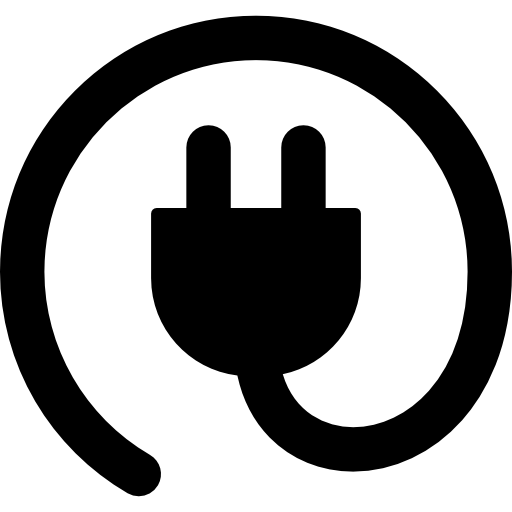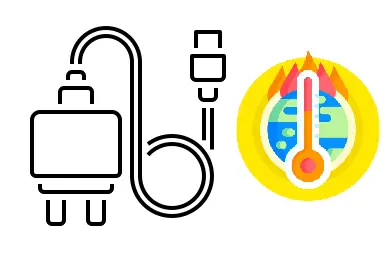When you notice that your USB charger is heating up for no apparent reason, you should not wait to act to avoid any risk to you or your device while it is charging. Indeed, a charger that heats too strongly can result from various more or less natural and more or less dangerous factors: a faulty power source, damaged or unsoldered components, an environment not conducive to charging, etc. So, without further ado, find out in our article what to do when your USB charger heats up? Find out first the causes explaining a heater in your charger. Then, discover the checks and procedures to follow to prevent overheating.
Why is your USB charger getting hot?

Know first that if your USB charger heats up slightly when charging your device, it is quite normal. This is because when a device is charging, the USB adapter converts alternating current into direct current. This in order to provide the power adapted to your device. This mechanism consumes energy, part of which is given off in the form of heat. As you will have understood, this phenomenon is natural and has no effect on the lifespan of the device.
Note: A fast charging usb charger will tend to heat up more than a conventional USB charger because the power delivered is greater.
However, when the usb charger is so hot that you have trouble touching it, that it does not stop heating after completing the loading or that strange symptoms appear (slow loading, any odor, charger whistling etc), these are signs that should alert you to a probable overheating of the USB charger potentially generated by a dysfunction.
Note: A USB charger that heats up more strongly once in a while may be normal if the charging context explains it. For example, if you use the device at the same time as it is charging, it will tend to heat up more than usual.
All of this dysfunctions ou factors that can lead to abnormal and excessive heating of the charger are:
- an environment not conducive to charging (too hot and not ventilated)
- a faulty power source
- faulty USB charger components or power supply
- the use of a low-end, counterfeit or incompatible charger
If in doubt about a potential overheating of your USB charger, we invite you to follow our troubleshooting guide below to avoid any damage or risk such as a short circuit, damage to your device, or an electrical fire.
How to fix the overheating problem on a USB charger?
Check the charging environment
When your USB charger gets too hot, you will first need check the environment in which you put to charge your device. In fact, make sure that the charger and the device being charged are in a dry, not too hot (which does not exceed 30 ° C) and ventilated environment. Also make sure that it is not laid or covered by too thick or insulating materials (duvet, carpet, etc.). Finally, never place your charger in the sun or near a heat source such as a radiator.
Read also: Charger that sizzles, what to do?
Check the power source of the USB charger

If the charging environment is favorable, then check if the overheating of your USB charger is not from its power source. Indeed, it can fail and cause voltage peaks that are harmful to the charger.
To check this, plug your charger into a different AC outlet. If you find that the temperature of the USB charger is higher on one outlet than another, then we recommend that you have it checked by an electrician. If necessary, he can then secure it for you. In case you are using a power strip or extender to charge your device, remove them. In fact, these products can cause electrical interference and voltage concerns that could trigger excessive heating of the charger.
Check the operating status of your charger
When your overheating usb charger, the problem comes in the vast majority of cases from a malfunction originating from one of its components or his internal power supply. Also note that if you use a non-original USB charger, it may be low-end or counterfeit and that the materials and technologies used do not prevent overheating. Finally, it is also likely that the charger you are using is not not compatible.
Note: If your cable is damaged (stripped, bent, melted etc), do not use it anymore! Its internal connectors are probably damaged. You risk causing a short circuit.
Then check if the problem comes from the charger, is more specifically the charging cable or USB adapter. To do this, connect your current adapter with another cable then try with the opposite combination. If in one case the USB charger heats up abnormally and not in the other case, then there is no doubt. You will then need to replace it with a new charger. But be careful, being vigilant that it is compatible and qualitative to prevent overheating from occurring again, or that other inconveniences appear.
Note: If the charger heats up when changing the electrical outlet or changing the charger, then the problem may be with the USB port of the device being charged. Contact the brand or the after-sales service where the device is sold for a more in-depth diagnosis, in particular if you are still entitled to the warranty. If they can't do anything, contact an electronic appliance repair store.
Replace your USB charger
If you are using a USB charger that heats up abnormally due to a faulty charging accessory or low-end charger, you will need replace it by respecting a few criteria :
• Avoid low-end or counterfeit chargers. In addition to using poor quality materials, components and assemblies, they do not always comply with applicable safety regulations and standards. For example, they do not have a safety device preventing and / or protecting your charger from overheating. Moreover, a USB charger that overheats will in the vast majority of cases be a low-end or counterfeit charger. To be sure that the charger complies with European Union legislation, and therefore to avoid overheating problems, the USB adapter must be CE marked.
• Make sure the charger is compatible. That is, it must have the same charging current. More specifically, the amperage (A) must be similar to that of the original charger. Be aware that a lower charge current is the first factor causing overheating to occur. Another way to know that a charger is not compatible is its charging speed. If your device is charging slowly, chances are the charging capacity is less than it needs.
Note: A USB charger from one brand can be replaced with a charger from another manufacturer, but provided that it is of the same charging current or compatible with Power Delivery 3.0 standard. This standard allows a device to be charged with any USB-C charger because it adapts and delivers a compatible charging voltage and current. It is therefore relatively universal. Be careful, however, that your device complies with the standard.
• Prefer the purchase of approved USB charger to be certain of the quality and compatibility of the product. To do this, go to the physical or online store of the manufacturer of your device. Or purchase the charger from a physical or online certified product reseller.


Very informative and persuasive how to solve the issues raised
MY MOTOROLA CHARGER IS THE ORIGINAL CHARGER AND HAS RECENTLY OVERHEATED
Hello,
Have you checked that the problem does not come from the socket on which your device is charging?
Otherwise, the overheating of the original charger may occur if it is defective (damaged internal wires or faulty internal components of the adapter (transformer, coils, etc.). In this case, you probably need to replace it with another compatible charger or at best Motorola certified.
cordially